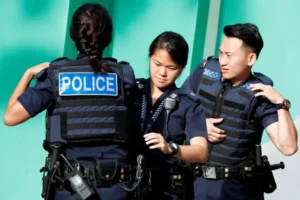Singapore authorities have detained a teenage boy who was allegedly planning to carry out a violent attack on Muslims. The 16-year-old, whose identity has been withheld, was arrested under the Internal Security Act (ISA) after a thorough investigation revealed his intentions to commit mass murder. Authorities believe that the teen had been influenced by extremist ideologies and had been plotting to target a mosque during the holy month of Ramadan.
The boy, who had no prior criminal history, was reportedly in the process of acquiring weapons and making arrangements to carry out the attack. His plans were foiled after intelligence agencies intercepted his communications and alerted the authorities.
Singapore’s Internal Security Department (ISD) has emphasized the importance of preemptive measures in preventing such attacks. The country remains committed to upholding religious harmony and safeguarding its diverse communities. The detention of this teenager raises essential questions about the spread of extremist ideologies among youth, even in peaceful societies like Singapore.
Introduction: A Shocking Plot Uncovered in Peaceful Singapore

In a country known for its multi-religious harmony and strict law enforcement, Singapore was recently shaken by a disturbing revelation. Authorities detained a teenage boy accused of planning a violent attack targeting Muslims, sparking national and international concern. This rare incident has reignited discussions around extremism, youth radicalization, and religious tolerance in one of Asia’s safest nations.
Details of the Arrest
According to the Singapore Internal Security Department (ISD), the 16-year-old ethnic Indian Christian boy was detained under the Internal Security Act (ISA) in the early part of the year. The teen had allegedly been radicalized online and was planning a brutal mass killing at two mosques, inspired by past global acts of white supremacist terrorism. Authorities acted swiftly after receiving intelligence on his online behavior, preventing a potentially catastrophic event.
Planned Attack Inspired by Christchurch Massacre
Investigations revealed that the boy was heavily influenced by the 2019 Christchurch mosque shootings in New Zealand, in which a white supremacist killed 51 Muslim worshippers. The teen reportedly watched videos of the massacre, read the shooter’s manifesto, and even planned to replicate the attack using similar tactics. Authorities stated that he had conducted detailed surveillance of local mosques, drawn up attack plans, and even researched firearms and tactics.
No Access to Weapons, But Plans Were Advanced
Although the suspect did not have access to real firearms, he had attempted to build homemade weapons, including a machete and Molotov cocktails. He had also drafted notes and manifestos outlining his hatred for Islam and his intentions. The ISD described the boy as “self-radicalized” and “deeply influenced by far-right ideology.” His arrest highlights how online content can drive vulnerable individuals toward violent extremism, even without direct contact with terrorist groups.
Legal and Mental Health Response

Under the Internal Security Act, individuals can be detained without trial if they pose a threat to national security. The government emphasized that the teen was not charged with any criminal offense but was detained to prevent imminent harm. He is currently undergoing counseling and rehabilitation as part of Singapore’s approach to deradicalizing youth and reintegrating them safely into society when possible. Mental health assessments are also being carried out to determine the extent of his psychological condition.
Public Reaction: Fear, Sadness, and a Call for Unity
News of the plot was met with shock and sadness across Singapore’s diverse population. Singaporean Muslims expressed relief that the attack was thwarted but also shared fears about being targeted simply for their faith. Interfaith organizations, political leaders, and civil society groups came together to condemn the ideology of hate and reaffirm the country’s commitment to religious tolerance and harmony. Social media discussions reflected a mix of alarm, empathy, and calls for vigilance.
Government and Community Measures to Counter Radicalization
Singapore has a zero-tolerance policy toward terrorism and extremism. The Religious Rehabilitation Group (RRG) and Inter-Agency Aftercare Group have played a vital role in educating and counseling radicalized individuals. Following this case, the government reiterated its commitment to:
-
Monitoring online platforms for hate content
-
Promoting interfaith dialogue in schools and communities
-
Strengthening early warning systems to detect radicalization Community leaders also emphasized the need for parents, teachers, and friends to stay alert to changes in young people’s behavior, especially their online activity.
The Broader Global Issue of Youth Radicalization

This incident is not isolated to Singapore. Around the world, youth are increasingly being exposed to extremist ideologies via unfiltered content online. Whether driven by religious extremism or far-right ideologies, young minds can be manipulated into seeing violence as a form of expression or justice. Analysts warn that as digital platforms grow, so does the risk of lone-wolf attacks driven by misinformation, propaganda, and online hate forums. The Singapore case is a global wake-up call.
Vigilance, Compassion, and Unity Needed
The arrest of a 16-year-old boy allegedly planning to kill Muslims is a sobering reminder of the threats that even peaceful societies face. Singapore’s swift action prevented a tragedy, but the incident underscores the need for continued education, online regulation, mental health support, and interfaith cooperation. As societies grow more interconnected and digital, it becomes essential to nurture a culture of compassion, critical thinking, and tolerance to prevent hatred from taking root in the hearts of the young.
Frequently Asked Questions
Why was the teenage boy detained in Singapore?
He was allegedly planning to kill Muslims at a mosque during Ramadan.
How old is the boy who was detained?
The boy is 16 years old.
Under what law was he detained?
He was detained under Singapore’s Internal Security Act (ISA).
What motivated the boy to plan this attack?
Extremist ideologies reportedly influenced him.
Was the attack carried out?
No, the authorities intervened before the attack could happen.
What weapons was the boy planning to use?
The boy was in the process of acquiring weapons for the attack.
Was the boy involved in any prior criminal activities?
No, he had no prior criminal record.
How did the authorities learn about his plans?
The authorities intercepted his communications and received intelligence.
What measures are Singapore taking to prevent radicalization?
Singapore has implemented robust counter-radicalization programs and strict monitoring of extremist activity.
What is the current status of the boy’s detention?
He remains in detention while investigations continue under the ISA.
Conclusion
The detention of a teenage boy allegedly planning to target Muslims in Singapore has raised serious concerns about the influence of extremist ideologies on youth. While the attack was foiled, it serves as a reminder of the constant vigilance required to prevent radicalization. Singapore’s authorities have acted swiftly to ensure public safety, demonstrating the effectiveness of intelligence-sharing and proactive intervention. The case also highlights the broader issue of tackling radicalization within peaceful societies, where extremist views can still take root. Singapore continues to uphold its commitment to religious tolerance and security, focusing on preventing such incidents from occurring in the future through community engagement and education.

